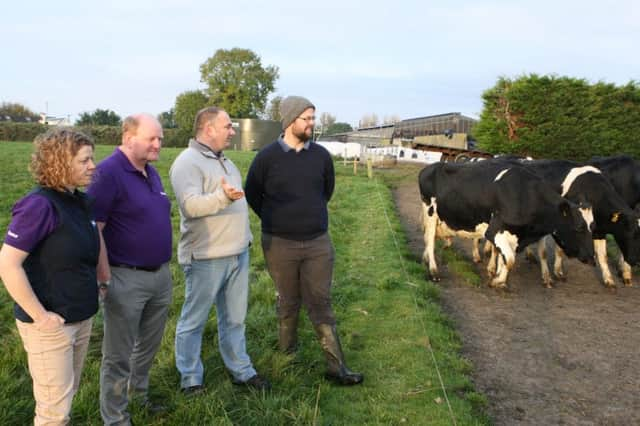Low production costs are the key to success, farmers warned


At the conference details were announced of a new, first-of-its-kind product set to revolutionise the way the veterinary profession addresses immune suppression during the transition period, with the potential to help reduce antibiotic usage.
Attended by veterinary surgeons and dairy sector executives, the conference featured a number of experts on immune suppression and herd health, including Prof. Dirk Werling, Royal Veterinary College London, and Mr John Cook, MRCVS, Elanco Animal Health.
Advertisement
Hide AdAdvertisement
Hide AdDeveloped by Elanco, the new product effectively aids in restoring the cow’s natural defences by increasing the number and restoring function of the primary type of white blood cell that recognizes and kills harmful bacteria.
€206 COST DIFFERENCE PER COW BETWEEN TOP AND AVERAGE DAIRY FARMERS
Mr Ryan said that, not surprisingly, dairy farmers have responded to the recent decline in milk prices by reducing costs.
“From 2014 to 2015 they did so by 0.5 cent per litre. In 2015 there was a 5.9 cent per litre difference, or €206 per cow, between the top 25% of dairy farmers and the average dairy farmer. This indicates the huge potential there is in the Irish dairy industry. The top farmers also produce 43 kgs of Milk Solids (MS) per cow more than Mr. Average due to their Fat/Protein percentage being 4.21/3.61 compared with 4.17/3.57,” he said.
Advertisement
Hide AdAdvertisement
Hide Ad“In 2015 Ireland had the lowest cash costs per kg of milk solids at €2.90 (78%) compared with an average of €3.70 for our European counterparts. And in the non-European zone on the world scene we have the second lowest costs as a percentage of dairy output,” he said.
Mr Ryan pointed out that research had identified two Key Performance Indicators (KPI) for Irish dairy farming:
*11/14 tons of grass DM utilised per hectare.
*Six weeks calving rate with target of 90% of herd.
“As many farmers are already reaching those targets we know they can be achieved. However, on average nationally at present we achieve approximately seven tons DM/ha, and the six weeks calving rate nationally is 58% - but improving by 1-2% per year.
“So overall, there is great potential for improvement. But financial management and financial planning are seriously deficient in the sector at present, and with tighter margins prevailing these will be essential prerequisites for successful dairy farming in Ireland in the future,” he said.
NEW TREATMENT HELPS RESTORE COW’S OWN NATURAL IMMUNITY
Advertisement
Hide AdAdvertisement
Hide AdJohn Cook, Technical Vet at Elanco, explained the importance of adopting a disease preventing approach to the calving period: “During the vital 90 TM days, 60 days before to 30 days after calving, dairy cows experience a dip in their natural immunity, leaving them especially vulnerable to important diseases such as mastitis, metritis and retained placenta. With serious cost consequences and implications for cow welfare and productivity, this makes the transition period one of the most challenging yet vital periods for vets and dairy farmers to manage. It’s no secret that a successful transition period is vital for maximising productivity in the next lactation, yet we are still ‘firefighting’ common transition diseases like mastitis rather than focusing on their true cause.
“Vets and farmers are under increasing pressure to adopt a more proactive approach, not least to reduce the use of antibiotics. This can be challenging in dairy herds, particularly around calving when cows are susceptible to multiple disease challenges while their defences are low. This new treatment helps to restore a cow’s own natural immunity and strengthens her ability to defend against infection by a range of mastitis causing pathogens – thus helping to protect the cow against mastitis when she needs it most,” he said.
BRAND NEW APPROACH TO IMMUNE RESTORATION
Eugene Smyth, Marketing manager, Elanco Ireland, described the product as a new approach to immune restoration.
“It can be extremely frustrating to see dairy farmers struggling with the stress and hassle of increased numbers of sick cows during calving. Reducing the negative consequences associated with immune-related diseases like mastitis could reduce this stress and maximise a herd’s milking potential. As concerns about antibiotic resistance rise, vets and farmers are under increasing pressure to help decrease their use. Restoring a cow’s own natural immunity is an effective way to help her fight a broad range of common mastitis pathogens.”
FIND NEW WAYS
Advertisement
Hide AdAdvertisement
Hide AdIn his presentation on the “Restoration of Innate Immunity in Dairy Cows”, Prof. Dirk Werling said that stress in dairy cows during the parturition phase increased the levels of cortisol, the hormone that affects immune response because it suppresses the immune function.
“Stress in cows makes them more susceptible to infection. Consequently, we need to find new ways to help them develop an effective immune response because old approaches to mastitis treatment are becoming less effective, and people are becoming more and more worried about antibiotic residues in food products.
“The solution, therefore, is to use what’s there – the cow’s innate immune system – by increasing the number and restoring function of neutrophils – the primary type of white blood cell that kills harmful bacteria. Elanco has launched a new product that prevents the dip in neutrophils during parturition,” he said.